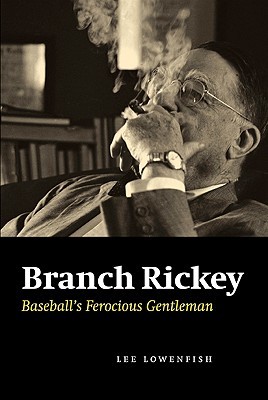
- We will send in 10–14 business days.
- Author: Lee Lowenfish
- Publisher: BISON BOOKS
- ISBN-10: 0803224532
- ISBN-13: 9780803224537
- Format: 15.2 x 22.6 x 3.8 cm, minkšti viršeliai
- Language: English
- SAVE -10% with code: EXTRA
Reviews
Description
He was not much of a player and not much more of a manager, but by the time Branch Rickey (1881-1965) finished with baseball, he had revolutionized the sport--not just once but three times. In this definitive biography of Rickey--the man sportswriters dubbed "The Brain," "The Mahatma," and, on occasion, "El Cheapo"--Lee Lowenfish tells the full and colorful story of a life that forever changed the face of America's game. As the mastermind behind the Saint Louis Cardinals from 1917 to 1942, Rickey created the farm system, which allowed small-market clubs to compete with the rich and powerful. Under his direction in the 1940s, the Brooklyn Dodgers became truly the first "America's team." By signing Jackie Robinson and other black players, he single-handedly thrust baseball into the forefront of the civil rights movement. Lowenfish evokes the peculiarly American complex of God, family, and baseball that informed Rickey's actions and his accomplishments. His book offers an intriguing, richly detailed portrait of a man whose life is itself a crucial chapter in the history of American business, sport, and society.
EXTRA 10 % discount with code: EXTRA
The promotion ends in 23d.12:53:13
The discount code is valid when purchasing from 10 €. Discounts do not stack.
- Author: Lee Lowenfish
- Publisher: BISON BOOKS
- ISBN-10: 0803224532
- ISBN-13: 9780803224537
- Format: 15.2 x 22.6 x 3.8 cm, minkšti viršeliai
- Language: English English
He was not much of a player and not much more of a manager, but by the time Branch Rickey (1881-1965) finished with baseball, he had revolutionized the sport--not just once but three times. In this definitive biography of Rickey--the man sportswriters dubbed "The Brain," "The Mahatma," and, on occasion, "El Cheapo"--Lee Lowenfish tells the full and colorful story of a life that forever changed the face of America's game. As the mastermind behind the Saint Louis Cardinals from 1917 to 1942, Rickey created the farm system, which allowed small-market clubs to compete with the rich and powerful. Under his direction in the 1940s, the Brooklyn Dodgers became truly the first "America's team." By signing Jackie Robinson and other black players, he single-handedly thrust baseball into the forefront of the civil rights movement. Lowenfish evokes the peculiarly American complex of God, family, and baseball that informed Rickey's actions and his accomplishments. His book offers an intriguing, richly detailed portrait of a man whose life is itself a crucial chapter in the history of American business, sport, and society.


Reviews